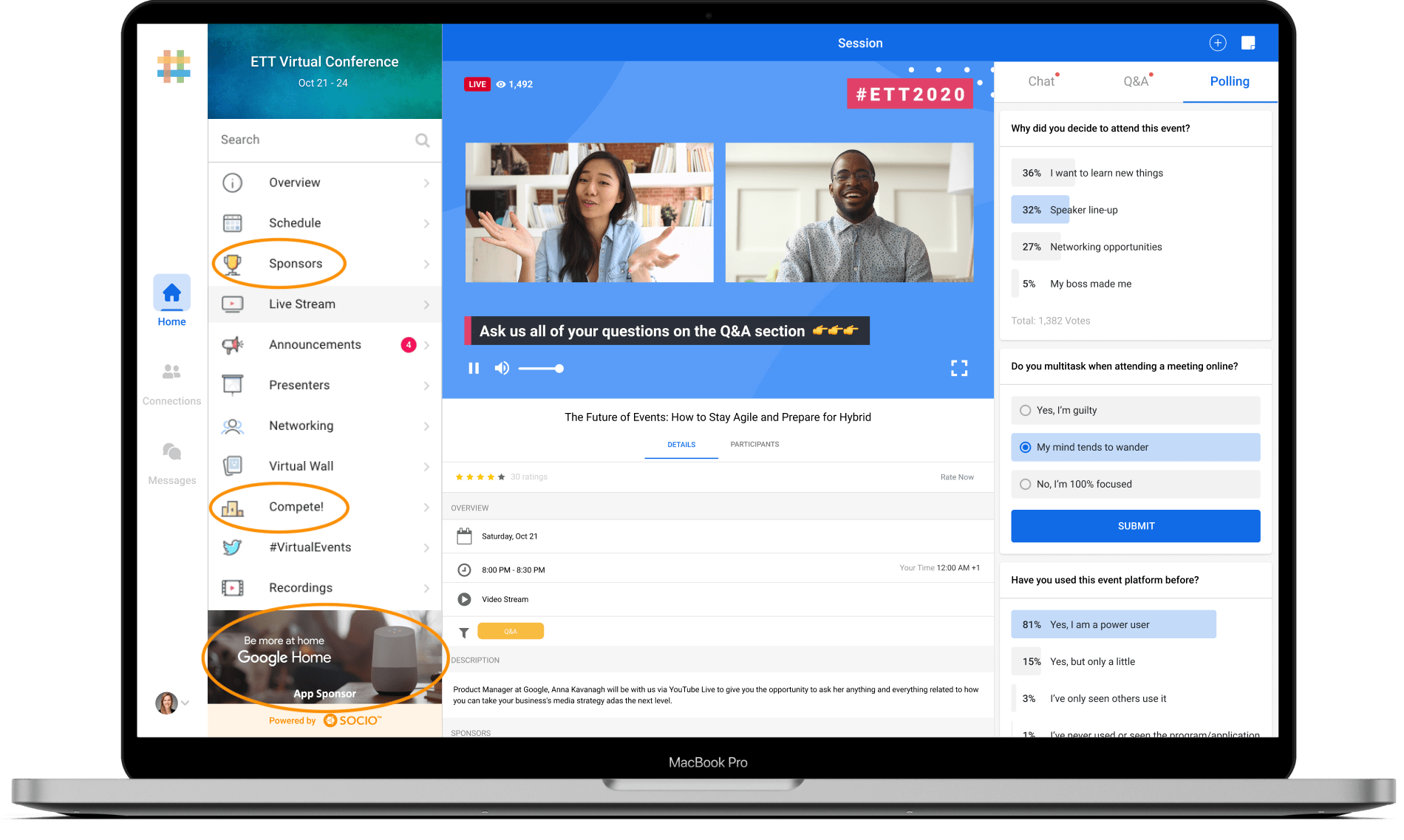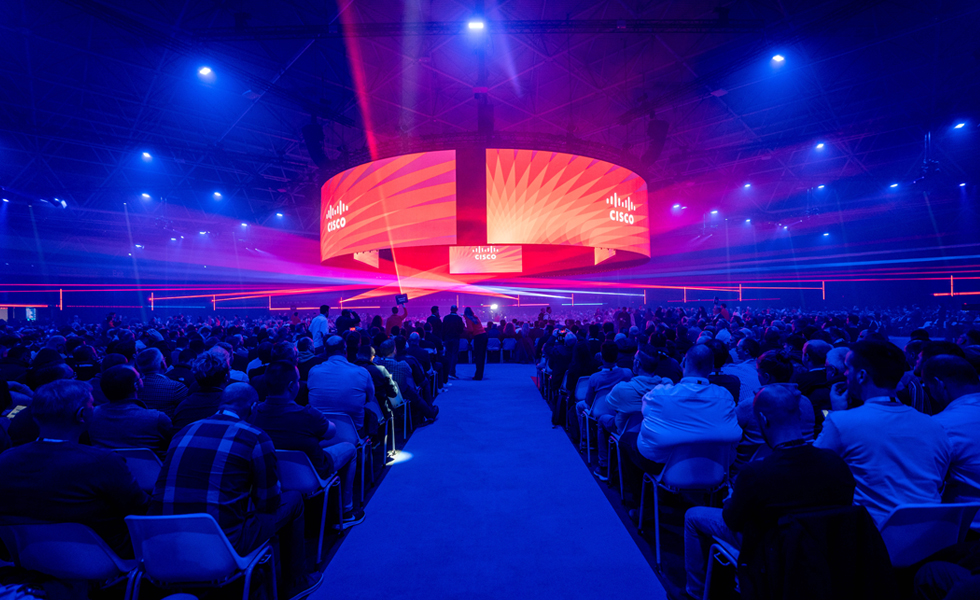On December, 8, 2020, Socio CMO Corey McCarthy gave a presentation on monetizing virtual events at EventMB’s 2021 Event Trends. Below is an excerpt of her presentation.
Why is it essential that we monetize virtual events next year?
Sitting back and doing nothing in 2020 wasn’t an option for most this year, and not finding a way to recoup revenue in 2021 is a deal breaker. We all have business goals that are not going to wait for the pandemic to pass, which means that we need to get creative and reshape what our income streams are going to look like for the coming year.
There are a few ways to look at revenue. For the events that generate a profit directly from hosting the event itself, there are four major categories of revenue.
- Registration – 46%
- Exhibits – 21%
- Sponsorships – 20%
- Advertising – 4%
Exhibits are tough as we haven’t seen anyone crush it there yet. When I speak with other CMOs, there are very few marketers that really miss trade shows. It’s undeniable that they produce some big deals, but most of the deals are reliant on the ability for a salesperson to connect with the decision makers they’ve been chasing. In person, it’s easy to see someone coming down the aisle of a trade show, or book a private meeting with a prospect in a suite. Online, we haven’t seen these 1:1 meetings recreated in a way that works in a virtual event environment—yet. Knowing this industry, we are close to cracking this code.
Sponsorships are far from dead. There are a lot of great ways to keep sponsorships alive, which we will get into a little later.
Advertising represents an interesting opportunity. If event organizers can lean into their attendee list and transition it into a Community, engagement can happen all year. This creates an opportunity to generate more revenue through year-long sponsorships and advertising campaigns.
If you’re hosting an event with the expectation that you’ll sell a product or service, metrics will look a lot more like digital advertising. Driving leads over to your sales team will be an important part of your monetization strategy in 2021. A few ways to generate leads are:
- Hosting VIP roundtables
- Integrating drift into live events with sales manning the “booth”
- Including gated content in a resource session
I can’t stress the importance of getting your sales team involved early and making them an integrated part of your event.
Regardless if you’re making money on the event or using an event to drive your product or service revenue, when considering how to generate ROI in 2021, registration numbers matter, and are usually the largest source of revenue for any event.
In a recent survey Socio conducted, 40% of respondents that said their virtual events in 2020 produced a negative ROI also said that their virtual event attendance rate has decreased from the attendance rate of their physical events pre-COVID, which means that generating event registrations will be one of the largest success factors in 2021.
The good news is that overall, virtual registrations and attendance are up. Even though registrations are up, only 27% are achieving a positive ROI, and just over half of respondents broke even from their virtual events.
Most event organizers offered free registration, which cut into their ROI. While offering free registration is important to expend overall reach and shouldn’t go away, there’s a place for paid registrations.
For virtual events, “Registration is the new attendance.”
What are some of the examples you have seen of effective monetization strategies for tickets?
Like I mentioned earlier, the good news here is that most people have seen their attendance rates increase, meaning there is more opportunity to monetize across the board. If not in ticket sales, then sponsor exposure and advertisements for sure.
In our study, we found that 61% of respondents say that their virtual event registration rate has increased from that of their pre-COVID physical events. And 45% report an increase in their virtual event attendance rate as well.
Many events have opened up free registrations, which is the first obvious hit to revenue that you should address. I wouldn’t be quick to ditch a free registration option altogether, as it will be an important part of achieving a higher level of overall reach that you’ll want to keep as we move into 2021. The additional exposure is a strong selling point if you have sponsors looking for brand awareness. If your event previously had a registration price tag, you’ll want to segment your ticket types to create differentiated levels of access for attendees.
Limiting the number of upgraded tickets available helps create demand and urgency. It also helps event organizers curate more meaningful experiences. Getting your big ticket holders to brag about that experience on social media is key, so train your audience to WANT to spend their money on that upleveled attendance options. This will make selling the tiered ticket classes easier for future events.
Make sure the paid options are compelling enough to bite on. Paid options can include:
- Curating unique content, speakers, networking, and experiences that drive value will also drive ticket revenue.
- Yearly membership to a thought leadership community with ongoing education and networking.
- VIP networking opportunities with speakers and peers.
- Celebrity keynotes or meet-and-greets.
- Partner with sponsors to send paid attendees something memorable to their homes that fits in with the theme of your event.
- Attendees are still willing to pay for education and professional credit hours, so don’t give up your rates just because it’s virtual. If the quality of the educational content is still there, there’s no reason to erode your price.
From registration, tickets can be segmented. And in your event platform, you can customize flows for each ticket type to help execute the differentiated experiences.
What about sponsors? What are some platform features we can use to make more money?

Again, registration is the key. Larger audiences will help attract and retain your sponsorship revenue. There’s a significant opportunity to grow your virtual attendee base beyond what you were able to accomplish in person, which you can use to attract (or keep) your event sponsors.
Think of your event platform as a digital advertising asset. There’s a lot of real estate to play with, so think of it as advertising inventory.
I’d work with each of your sponsors to create a customized package, based on their individual success metrics. This gets them to buy into the success of your event early and puts the onus on them to work with you to ensure their sponsorship is a success.
It can start with brand exposure on the registration page, email, a banner in the platform, or even a “sponsored by” call out in the opening splash page when attendees open the app. (Banners usually rotate giving you the opportunity include banners to multiple companies)
Platform sponsorship options can include:
- Starting with registration, include sponsor logos and link backs to their landing pages.
- Include their logos in all of your email promotions including registration confirmations.
- Banner real estate in the platform.
- Sponsor pages with gated assets, a call to action and meeting links.
- Sponsor CTAs.
- Sponsored push notifications: this should be used sparingly so that attendees don’t become numb to your push notifications or turn them off.
- Sponsored gamification: can be used to drive attendees to a sponsor website or product page.
With a digital platform, there’s also the ability to add tracking and use analytics to build custom lists over every attendee that clicked on a sponsor asset. Sponsors can use this data for lead generation, and to better measure their ROI.
Live streams open a whole new ecosystem of sponsorship opportunities, including:
- Overlays with offers or a thank you to a sponsor
- Sponsor logos
- Tickers can guide people to a sponsor “booth” or a sponsor-driven game
- Sponsor advertisements within the live session provide great air cover for transitions in the run of show. The video content is also a great way to keep engagement high by bringing in mixed media content to keep the show going.
- Allow a sponsor to be a mediator in a session
- Add a sponsor logo to the screen for a sponsored session
After the event concludes, sponsorship activations are a great way to keep a community going and create engagement and networking opportunities that can last year-round, increasing the value of your overall sponsorship packages.





